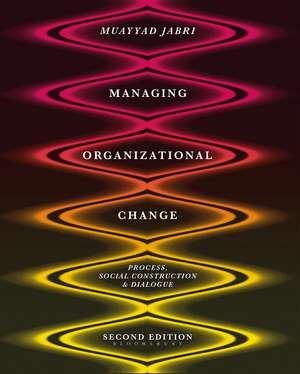Managing Organizational Change: Process, Social Construction and Dialogue
Autor Muayyad Jabrien Limba Engleză Paperback – 12 mar 2017
Preț: 348.29 lei
Preț vechi: 491.84 lei
-29% Nou
Puncte Express: 522
Preț estimativ în valută:
66.68€ • 68.57$ • 55.31£
66.68€ • 68.57$ • 55.31£
Carte indisponibilă temporar
Doresc să fiu notificat când acest titlu va fi disponibil:
Se trimite...
Preluare comenzi: 021 569.72.76
Specificații
ISBN-13: 9781137468574
ISBN-10: 1137468572
Pagini: 318
Dimensiuni: 177 x 234 x 19 mm
Greutate: 0.59 kg
Ediția:2nd ed. 2017
Editura: Bloomsbury Publishing
Colecția Bloomsbury Academic
Locul publicării:London, United Kingdom
ISBN-10: 1137468572
Pagini: 318
Dimensiuni: 177 x 234 x 19 mm
Greutate: 0.59 kg
Ediția:2nd ed. 2017
Editura: Bloomsbury Publishing
Colecția Bloomsbury Academic
Locul publicării:London, United Kingdom
Caracteristici
Offers a flexible, non-linear and non-prescriptive model to change management that seeks to minimise the amount of organisational stress placed on individuals and increase the likelihood of sustainable, long-term success
Notă biografică
Muayyad Jabri is Associate Professor at the University of New England Business School in Australia. He holds an MSocSc from Birmingham Business School (University of Birmingham) and a PhD from Manchester Business School (University of Manchester). As a Visiting Professor in a number of universities in Europe and the People's Republic of China (1997-2001), he has developed a keen interest in the philosophy of change as inspired by the work of Merleau-Ponty, Alfred North Whitehead and Mikhail Bakhtin. Muayyad previously held teaching positions at the University of Wollongong and Manchester Business School.
Cuprins
1. Defining Change 2. Constructing Change 3. Understanding the Role of the Change Agent 4. Constructing Change Through Narrative and Storytelling 5. Constructing Change Through the Field Concept 6. Creating Readiness and the Notion of Sensemaking 7. The Problem-Centric Model of Diagnosing Change 8. The Dialogic Model of Diagnosing Change 9. Modes of Intervening 10. Understanding and Managing Organizational Resistance 11. Communicating Change 12. Making Sense of Organizational Identity.
Recenzii
As we search for more dynamic, complex and relational ways of understanding organizations, there is an urgent need to enrich our vocabulary of change - to treat change in organizations as if change mattered. Muayyad Jabri's marvellous textbook moves us closer to this objective. It is filled with refreshing ideas and insights that make us think, and even feel, change. Drawing on process philosophies as well as state-of-the-art research on managing change, Muayyad invites his readers to appreciate the complexity and open-endedness of organizational change. This is insightful theory that makes a practical difference. Read this stuff and you begin to see organizations differently.
Drawn from a process orientation to change, this volume provides a refreshing twist to the traditional work in management and organizational studies. The twist comes through recasting classic topics in the change literature through the lens of dialogue. Readers are exposed to central problems, such as diagnosis, intervention and communication, but through reframing these topics from a view of change as unfolding over time, engaging with multiple stakeholders, and embracing relational views of openness and appreciation. The book is a must read for students and scholars of organizational change and development, communication and organizational change, and practitioners involved in change management.
Drawn from a process orientation to change, this volume provides a refreshing twist to the traditional work in management and organizational studies. The twist comes through recasting classic topics in the change literature through the lens of dialogue. Readers are exposed to central problems, such as diagnosis, intervention and communication, but through reframing these topics from a view of change as unfolding over time, engaging with multiple stakeholders, and embracing relational views of openness and appreciation. The book is a must read for students and scholars of organizational change and development, communication and organizational change, and practitioners involved in change management.
